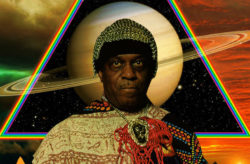Happy Birthday, Sun Ra [Part 1]
Overwhelmed by a game that has been played all around the planet, with Africa colonized and Africans enslaved by France, Great Britain, Portugal, Italy, the United Kingdom, the United State, Germany, Belgium, and the ancient Greeks and Romans—maybe a great majority of Black folks rightfully feel that the world is against them, and they have to get off the planet in order to be free. In the words of the band War, “For you and for me, the world is a ghetto.”[i]
And in a trickster move of reversal, Afrofuturism takes the concept of “other”—usually used in the context of explaining racism, a phenomenon of harm and oppression—and, through the invention of alien races and intergalactic travel, turns otherness into a fun celebration of liberation. Thus, Afrofuturism represents one of the more imaginative approaches to signifyin(g), represents the utopian possibilities of multiple worlds. Afrofuturism is about more than Eshù Elégba, but space is the place that gives Eshù’s Trickster spirit room to move and to not be defined only by opposition or by the experience of enslavement and oppression. Signifyin(g) is not linear or parallel to whatever the dominant game is, but perpendicular: the rigged game is a line that circumvents the planet. Afrofuturism launches perpendicularly into outer space.
So happy birthday to Sun Ra, the guy who invented the outer space aesthetic that was borrowed whole cloth by musicians Janelle Monáe and George Clinton of Parliament/Funkadelic. Though the term Afrofuturism was coined in the early 1990s, its origin traces directly to the jazz genius, iconoclast, prophet, activist, and angel Sun Ra. Sun Ra, who made it clear to the world that “space is the synonym for a multi-dimension of different things other than what people might at present think it means. So I leave the word space open, like space is supposed to be, when I say space-music.” [i]

Herman Poole “Sonny” Blount, who would become Sun Ra, was born on May 22, 1914, but according to him, was reborn years later, “These space men contacted me. They wanted me to go to outer space with them. They were looking for somebody who had that type of mind.” [ii] He met up with them while in college, and they transported him to Saturn, where he was taught things that would save Earth from doom.
This experience informed his spiritual philosophy, Thmei. Named after the Egyptian dual goddess of truth and justice, Thmei Research was a society antidotal to dominant white narratives and intended specifically for the Black audiences of Chicago’s South Side in the mid-1950s. Theosophical[2] in its bent, Thmei’s association with Egypt lent itself to Black pride. Egypt is an African culture not only more ancient than Greek democracy, Judeo-Christian tradition, and Islam but a culture with a government and an order that lasted five thousand years.
Thmei offers three principles. First, Thmei presented a philosophical and spiritual text that explicitly did not justify or allow the slavery and subjugation of Black people, or of any people. The second principle distinguishes Thmei Research from the separatist and counterracist Nation of Islam, which was gaining in popularity at the same time. Though also a Black voice tuned for Black people, Thmei’s Black nationalism, unlike the Nation of Islam, proposed and performed a post-racial future of truth, justice, and beauty for all humanity. Thirdly, in the indeterminate mode of the West African trickster god Eshù, Thmei made no claims of being absolutely right in their path, only that their path was different and better than its more doctrinaire fellows.
In 1952, Herman Blount legally changed his name to Le Sony’r Ra. And his reputation as a jazz innovator began the grow. But through his extensive writings, his radical lifestyle, his adherence to Thmei’s mythological and utopian vision, and his iconic personality—was about much more than his music. Yet it is the music we turn to as proof of his genius and the world he created, one congenial to Trickster spirit. Stay tuned for more about Ra’s music in Part 2, coming to your inbox soon!
[I] “The World Is a Ghetto,” track 2, side 2 on War, The World Is a Ghetto, Avenue Records, 1992.
[2] Theosophy functions as a bridge between East and West, emphasizing the commonality of human culture.

Folks! You haven’t heard from me lately, I’ve been tied up with matters of cosmic significance, but hear me now! Especially y’all from the great big town of Portland, Oregon and beauteous Clark County, Washington., Come together, people, for the entertaining and hope-provoking fun of meeting up with The Trickster in Politics and Culture: I’ll...
I mean, IF you find yourself in Sultan on May 18th . . . (at NOON) You just might find Your Trickster Self . . . Squeeeee!!!! I’ll be making a fun presentation at The Sultan Library 319 Main St Sultan, WA 98294 Saturday May 18th at Noon Tricking Power into Performing Acts of Love...
Haven’t seen the movie “Poor Things?” Want its surprises? Then GO SEE IT before you read this… and in the meantime, click the image below v v v A LITTLE PLUG FOR YOU BOOK CLUBBERS [CLICK!] In their 2018 period comedy The Favourite, Arizonan Emma Stone and Athenian Yorgos Lanthimos gave us clues of mischief...